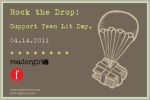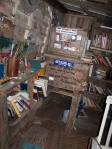Around the world, there are thousands of literacy initiatives organized by governments, libraries, non-profits and for profits – many notable and successful. However, this week I pose the question: to what extent is literacy the responsibility of us, as everyday citizens in our communities?
Here are five ways that citizens are stepping up in their communities to share literacy…
1. Boys, Literacy and Role Models
As the parent of a two-year old boy, I am becoming increasingly aware of the  issues surrounding boys and literacy. This is coupled with my seven-year old daughter’s question a few months ago: “Mommy, why do only the moms volunteer in my classroom?” While I know that there are many wonderful dads homeschooling or volunteering their time in educational programs, her question struck me as important and perhaps linked to issues of learning and literacy. Research studies support this idea, such as this guide from the Ontario Ministry of Education linking the importance of male role models to improvements in boys’ literacy skills. If you want to learn more about these issues, or take action on them, Beth Hering offers a great practical guide to how men can volunteer in elementary schools. The website Guys Read also provides fantastic inspiration for starting your own ‘Guys Read Field Office’.
issues surrounding boys and literacy. This is coupled with my seven-year old daughter’s question a few months ago: “Mommy, why do only the moms volunteer in my classroom?” While I know that there are many wonderful dads homeschooling or volunteering their time in educational programs, her question struck me as important and perhaps linked to issues of learning and literacy. Research studies support this idea, such as this guide from the Ontario Ministry of Education linking the importance of male role models to improvements in boys’ literacy skills. If you want to learn more about these issues, or take action on them, Beth Hering offers a great practical guide to how men can volunteer in elementary schools. The website Guys Read also provides fantastic inspiration for starting your own ‘Guys Read Field Office’.
2. Little Free Libraries (LFL)
This is an ingeniously simple idea: build an outdoor structure that looks like a  bird house but acts like a library. Visitors can take a book or leave a book (or both). This not only provides resources for literacy, but also allows people from the same neighbourhood or workplace to be exposed to one another’s interests, boosting literacy and a sense of community at the same time. The LFL website is filled with lots of great resources, both inspirational and practical. There is also an interesting article on the phenomenon on the Abundant Community blog.
bird house but acts like a library. Visitors can take a book or leave a book (or both). This not only provides resources for literacy, but also allows people from the same neighbourhood or workplace to be exposed to one another’s interests, boosting literacy and a sense of community at the same time. The LFL website is filled with lots of great resources, both inspirational and practical. There is also an interesting article on the phenomenon on the Abundant Community blog.
3. Street Libraries
Similar to the Little Free Libraries, these libraries are run by volunteers and bring books to the people living on the street. For example, Laura Moulton has created a library in a bike trailer in Portland. Twice a week she rides her mobile lending library around downtown. You can read more about her experiences here and at her blog. In Australia, a similar project has taken root called the Footpath Library. The impact of these street libraries on both literacy and community is summed up by one of the Footpath Libraries’ regulars: ‘For those of us living in crappy little rooms, on the streets, isolated in public housing flats or in cars, it’s the fact that there’s other people around to talk and gossip with, and to be treated with a bit of dignity. They’re big things. And then at the end of the night, to go back to wherever you’re sleeping and have something to read; to forget about your worries before drifting off to sleep is wonderful.” A similar project is the Albany Bulb Library – a library built by and for homeless people.
4. Literacy in the Environment (LITE)
Retired Vancouver educator Vi Hughes and city planner Frances Warner  have made it their goal to increase literacy among children by placing words in public spaces at a level at which children can see them. Examples include printing “…the words “up” and “down” on the stairs at recreation centres, write “slide” and “swing” on playground equipment… erect a sign with a simple poem and bright pictures at eye level for children … or put numbers on the floor for counting.” The idea is catching on among city planners and non-profits seeking to promote healthy communities.
have made it their goal to increase literacy among children by placing words in public spaces at a level at which children can see them. Examples include printing “…the words “up” and “down” on the stairs at recreation centres, write “slide” and “swing” on playground equipment… erect a sign with a simple poem and bright pictures at eye level for children … or put numbers on the floor for counting.” The idea is catching on among city planners and non-profits seeking to promote healthy communities.
5. Rock the Drop
Each year, Teengirlz ask people to support teen literacy in their communities by simply leaving books lying around for others to pick up. A simple way to share  books with one another.
books with one another.
The more I look, the more examples I find of great grassroots projects that connect community and literacy: the story of the Occupy Wall Street People’s Library, which is still evolving; or the library in a locker, run by a high school student who wanted to make banned books available to her fellow students. Do you have an example from your experience?
Please click on photos to hyperlink to their authors.



